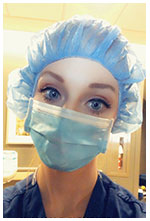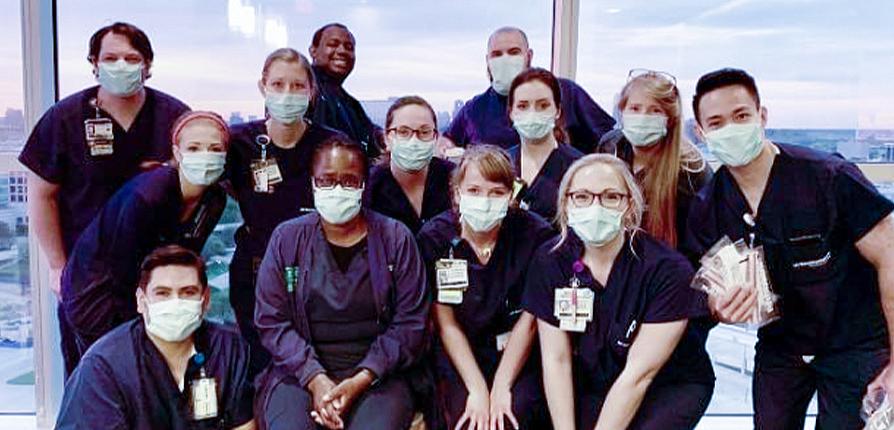Nursing alumna provides vivid view from COVID-19 patient rooms
Story by Jo Gilmore
Photos courtesy of Lisa Miller
 As one of the nurses working in the “float pool” at the University of Texas Southwestern Medical Center in Dallas, Lisa Miller ’14 goes where she’s needed the most based on patient census and acuity.
As one of the nurses working in the “float pool” at the University of Texas Southwestern Medical Center in Dallas, Lisa Miller ’14 goes where she’s needed the most based on patient census and acuity.
At the beginning of March, Miller learned she’d be working in the COVID-19 unit, a group of 20 to 30 rooms blocked off for patients infected with the virus.
“I felt anxious but also grateful for the hospital entrusting me to care for patients with this novel virus,” she said.
When the first “person under investigation” for possible COVID-19 infection arrived at the hospital, Miller received a step-by-step tutorial on how to don and doff personal protective equipment.
First, she had to wash her hands and put on gloves, followed by her booties, gown, N95 mask and face shield. Lastly, she put on her hair bonnet and a second set of gloves. Removing PPE requires an even more methodical process to help avoid infection, Miller said.
“We had a second nurse supervise the donning and doffing of this equipment each time, especially since the highest rate of infecting ourselves occurs when removing our PPE.” On her very next shift, Miller began taking care of a person under investigation.
At that point, UT Southwestern medical personnel had to wait two to four days for their patients’ COVID-19 test results, so they treated all people under investigation as if they had the virus.
Two nurses were assigned to one patient to ensure the proper use of PPE and limit patient exposure as the nurses switched roles with each patient’s entry. The nurse in the room providing direct patient care directed the “runner nurse” outside the room to retrieve supplies not readily accessible in the room.
“This helped our PPE last longer,” Miller said.
Because of the highly infectious nature of COVID-19, UT Southwestern initially designated Miller and the other nurses in the float pool as the primary nursing providers for patients with the virus and limited access to these patients’ rooms to the nurses.
“That meant we had to learn how to administer respiratory treatments, perfect our phlebotomy skills and embrace the role as a patient care tech,” Miller said.
This included detailed physical exams using Bluetooth stethoscopes with recording capabilities so that physicians, who stood outside the room to avoid coming into direct contact with the patient, could listen to the patient’s heart and lungs.
“This helps preserve PPE and limits the staff’s overall exposure to the virus,” Miller said.
Nurses also helped provide emotional support by connecting patients with their families via a conferencing app on the hospital’s TVs.
As the number of positive and ruled-out cases increased, the COVID-19 unit grew to encompass the entire hospital floor, and other UT Southwestern nurses were trained to take care of COVID-19 patients.
“It has been encouraging to see nurses from all different departments come together as we embrace the different daily challenges that have come with this virus,” Miller said.
Because she was one of the first float pool nurses on the UT Southwestern front line, Miller helped train nurses new to the unit and cautioned them to eliminate all outside distractions.
“It’s important to be fully present because the patient is extremely isolated,” Miller said. “Therefore, time with the patient should be efficient and clustered, but also empathetic and caring.”
She warned nurses that forgetting to complete the simplest task could lead to using additional PPE to re-enter a room.
“Preserving PPE is something we all worked diligently to do,” Miller said. “The nationwide shortage of PPE and subsequent rationing of certain PPE items generated a lot of stress and anxiety for nurses.”
She credits SFA’s DeWitt School of Nursing for preparing her to serve during this pandemic. “It was such an amazing experience and certainly gave me the foundation of knowledge needed to effectively take care of COVID-19 patients,” Miller said.
She believes the pandemic has and will continue to change the nursing profession.
“I’ve noticed nurses from different specialties coming together to support one another and cross-train,” Miller said. “I am hopeful the next nursing generation will be inspired by this pandemic and know that they can help with change and really make a difference.”
Image caption: Lisa Miller '14 (middle row, far left) and other COVID-19 unit nurses at UT Southwestern Medical Center in Dallas initially served as the primary nursing providers for patients with the virus. They examined patients using Bluetooth devices while physicians outside the room assessed vitals.
 Axe ’Em, Jacks!
Axe ’Em, Jacks!
